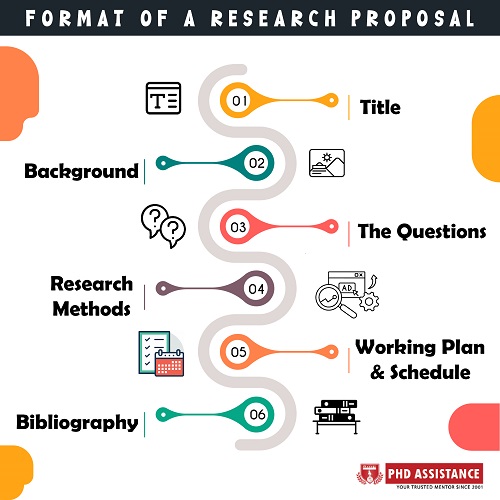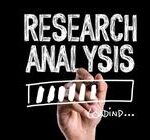Writing a Research Proposal for business management
A research design is a thorough plan that helps a research project achieves its goals. Business research is a scientific examination that entails a series of highly interconnected operations, each of which might have negative consequences for subsequent activities if completed incorrectly (Greener, 2021). The steps of the business research proposal process are explained in this blog.

Fig1. Writing a Research Proposal
- Identifying the Problem
The determination of the topics that need to be explored is the first step in the research process. In the case of fundamental research undertaken by academics, a topic of interest or a new field of inquiry is found.
2. Collection of basic literatures
Following the identification of the problem, the following stage is to gather preliminary data/literature that can aid in developing a basic grasp of the problem; in the case of business difficulties consulting, this can aid in understanding the scenario (Saeed et al., 2021).
3. Problem Statement
Although other writers may not have included this step as an explicit step, I believe it is critical to explicitly express the problem. Clearly defining the problem with a statement can give significant benefits. It can assist in generating a clear knowledge of the issue that needs to be handled, as well as clearly spelling out the objectives that must be met in order to solve the problem.
4. Detailed Literature Review
Literature review is an important aspect of academic research since it acts as the heart of the study. It expands research horizons, aids in the development of focus, gives direction, and minimises ambiguity. A literature review entails searching the body of knowledge for relevant literature that will aid in not only identifying but also determining the direction of relationships between variables, as well as in the formulation of hypotheses. It will also be useful in discussions later on in the research (Pereira et al., 2021).
5. Research Hypothesis
A hypothesis is a well-informed estimate; it’s called such since it’s founded on the conceptual framework established in the literature study and theoretical framework. Predictable and testable hypotheses are essential.
6. Methodology
The researcher decides how the research will be carried out at this stage. It is critical that this part provide adequate information to the reader so that he or she may easily reproduce the research in their own situations (Wickert et al., 2021).
Step 7: Collecting data
After deciding on a study approach, the following step is to gather data. Telephonic interviews, individually delivered surveys, postal questionnaires, face-to-face interviews, and observation are all examples of data collection methods.
Step 8: Data Entry and Screening & Cleansing of Data
The first step is to enter the information into any statistical programme that can aid in rapid data analysis. It is critical to review and cleaning of data for any irregularities once it has been submitted; failing to do so will result in inaccurate results.
Step 9: Data Analysis with statistical techniques
The next stage is to conduct proper statistical study based on the study hypothesis after the data has been input and cleaned. To examine the data, a variety of procedures are employed.
Step 10: Interpretation/Presentation of Results
After the data has been processed and the findings have been displayed on the screen, the following step is to analyse the data before presenting it. Contact PhD Assistance for any of your PhD requirements as we offer PhD Dissertation Writing UK, Content Quality of Dissertation Proposal UK. The interpretation of the results is one of the most important challenges that most studies encounter. The researcher must assess whether the findings are important, whether the hypothesis is correct, and then report the findings in a clear and understandable manner (Johnson et al., 2021).
Step 11: Discussion
The Discussion chapter is the most significant portion of the article and the culmination of the study, but it is often overlooked. The majority of newcomers to research just interpret the findings without discussing them. Reviewing the research findings in light of previous research is part of the discussion. This part entails comparing and contrasting the study findings with those of earlier studies to evaluate if the findings are comparable or conflicting. If they are in conflict, the researcher must determine what is causing the change.
Step 12: Conclusion
A conclusion is the last phase of a research project. It gives a high-level summary of the thesis while highlighting the key areas of debate. This section presents the study findings in a logical order (Nair et al., 2021). When the conclusions agree with the findings of other studies, they might cite references.
References
Bell, Bryman, and H. (2018). Formulating a research proposal. https://learninglink.oup.com/static/5bf28a25d910f40011b79ade/page_12.htm
Greener, S. L. (2021). Non-supervisory support for doctoral students in business and management: A critical friend. The International Journal of Management Education, 19(2), 100463. https://doi.org/10.1016/j.ijme.2021.100463
Hejase, H. J. (2022). Faculty of Business Administration Guidelines on Writing the MBA Research Project / Thesis Faculty of Business Administration Guidelines on Writing the MBA Research Project / Thesis Applicable to most business emphases Accounting Economics Finance Hospita. February. file:///C:/Users/user/Downloads/MBAResearchProject-ThesisManuscriptFebruary2022.pdf
Johnson, C. D., Bauer, B. C., & Niederman, F. (2021). The Automation of Management and Business Science. Academy of Management Perspectives, 35(2), 292–309. https://doi.org/10.5465/amp.2017.0159
Nair, R., Arshad, R., Abd Aziz, A. Z., & Muda, R. (2021). A critical reading of impression management in times of financial crisis and implications for business writing. Journal of Education for Business, 96(4), 230–236. https://doi.org/10.1080/08832323.2020.1806017
Pereira, L., Santos, R., Sempiterno, M., Costa, R. L. da, Dias, Á., & António, N. (2021). Pereira Problem Solving: Business Research Methodology to Explore Open Innovation. Journal of Open Innovation: Technology, Market, and Complexity, 7(1), 84. https://doi.org/10.3390/joitmc7010084
Peterson, M. (2021). Teaching the Online Marketing Research Course for MBA Students. Journal of Marketing Education, 43(3), 371–385. https://doi.org/10.1177/02734753211001422
Saeed, M. A., Mohammed H. Al-Ahdal, A. A., & Al Qunayeer, H. S. (2021). Integrating research proposal writing into a postgraduate research method course: what does it tell us? International Journal of Research & Method in Education, 44(3), 303–318. https://doi.org/10.1080/1743727X.2020.1777963
Shao, H., Zhang, Z., & Wang, B. (2021). Research on accounting information security management based on blockchain. Mobile Information Systems, 2021. https://doi.org/10.1155/2021/9926106
Wickert, C., Post, C., Doh, J. P., Prescott, J. E., & Prencipe, A. (2021). Management Research that Makes a Difference: Broadening the Meaning of Impact. Journal of Management Studies, 58(2), 297–320. https://doi.org/10.1111/joms.12666
 Previous Post
Previous Post Next Post
Next Post
